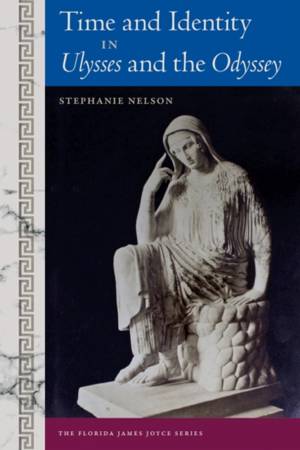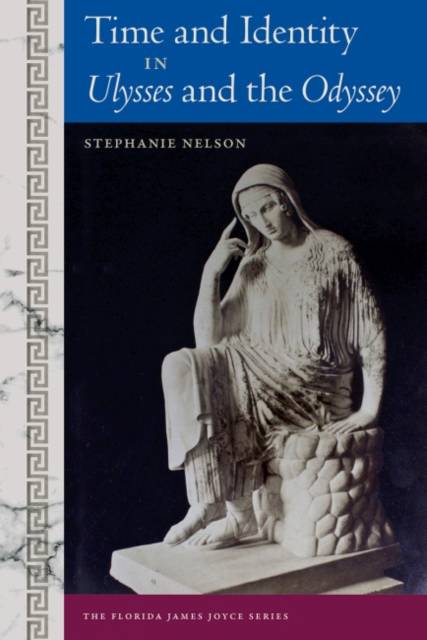
- Retrait gratuit dans votre magasin Club
- 7.000.000 titres dans notre catalogue
- Payer en toute sécurité
- Toujours un magasin près de chez vous
- Retrait gratuit dans votre magasin Club
- 7.000.000 titres dans notre catalogue
- Payer en toute sécurité
- Toujours un magasin près de chez vous
Description
A comparative study of two classic
literary works, from a specialist in Joyce and Homer Time and Identity in
"Ulysses" and the "Odyssey" offers a unique in-depth comparative study of
two classic literary works, examining
essential themes such as change, the self, and humans' dependence on and
isolation from others. Stephanie Nelson shows that in these texts, both Joyce
and Homer address identity by looking at the paradox of time--that people are
constantly changing yet remain the same across the years. In Nelson's analysis, both Ulysses
and the Odyssey explore dichotomies
including the permanence of names and shifting of stories, independence and
connection, and linear and cyclical narrative. Nelson discusses Homer's
contrast of ordinary to mythic time alongside Joyce's contrast of "clocktime"
to experienced time. She analyzes the characters Odysseus and Leopold Bloom,
alienated from their previous selves; Telemachus and Stephen Dedalus, trapped
by the past; and Penelope and Molly Bloom, able to recast time through weaving,
storytelling, and memory. These concepts are also explored through Joyce's
radically different narrative styles and Homer's timeless world of the gods. Nelson's thorough
knowledge of ancient Greece, Joyce, narratology, oral tradition, and
translation results in a volume that speaks across literary specializations. This
book makes the case that Ulysses and
the Odyssey should be read together
and that each work highlights and clarifies aspects of the other. As Joyce's characters
are portrayed as both flux and fixity, readers will see Homer's hero fight his
way out of myth and back into the constant changes of human existence. A volume in the Florida James Joyce Series, edited by
Sebastian D. G. Knowles
literary works, from a specialist in Joyce and Homer Time and Identity in
"Ulysses" and the "Odyssey" offers a unique in-depth comparative study of
two classic literary works, examining
essential themes such as change, the self, and humans' dependence on and
isolation from others. Stephanie Nelson shows that in these texts, both Joyce
and Homer address identity by looking at the paradox of time--that people are
constantly changing yet remain the same across the years. In Nelson's analysis, both Ulysses
and the Odyssey explore dichotomies
including the permanence of names and shifting of stories, independence and
connection, and linear and cyclical narrative. Nelson discusses Homer's
contrast of ordinary to mythic time alongside Joyce's contrast of "clocktime"
to experienced time. She analyzes the characters Odysseus and Leopold Bloom,
alienated from their previous selves; Telemachus and Stephen Dedalus, trapped
by the past; and Penelope and Molly Bloom, able to recast time through weaving,
storytelling, and memory. These concepts are also explored through Joyce's
radically different narrative styles and Homer's timeless world of the gods. Nelson's thorough
knowledge of ancient Greece, Joyce, narratology, oral tradition, and
translation results in a volume that speaks across literary specializations. This
book makes the case that Ulysses and
the Odyssey should be read together
and that each work highlights and clarifies aspects of the other. As Joyce's characters
are portrayed as both flux and fixity, readers will see Homer's hero fight his
way out of myth and back into the constant changes of human existence. A volume in the Florida James Joyce Series, edited by
Sebastian D. G. Knowles
Spécifications
Parties prenantes
- Auteur(s) :
- Editeur:
Contenu
- Nombre de pages :
- 300
- Langue:
- Anglais
- Collection :
Caractéristiques
- EAN:
- 9780813069357
- Date de parution :
- 05-07-22
- Format:
- Livre relié
- Format numérique:
- Genaaid
- Dimensions :
- 152 mm x 229 mm
- Poids :
- 607 g







